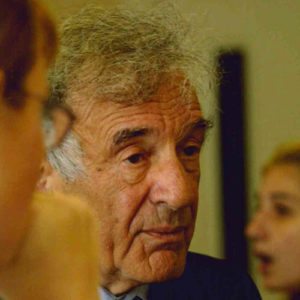My Time With Professor Wiesel
I don’t remember what I expected from Professor Elie Wiesel’s class. I imagine I expected to discuss the horrors of the Holocaust, injustice and dignity and to leave the course with a deeper understanding of the Israel and Palestinian conflict. I could not have expected what actually did happen—I developed a perspective on what it means to be alive; to live with a steadfast, conscious and open heart; and to act virtuously as a citizen of the global community.
My only knowledge of Professor Wiesel came from reading his most famous book, Night, which is a slim volume recounting his harrowing and traumatic experience during the Holocaust. However, as a history major with Jewish heritage, I recognized this as an important opportunity to learn about the history of a culture I was otherwise divorced from. On the first day, I found the delicate older man I had expected. What I didn’t expect, though, was his powerful and silent presence of peace and wisdom.
It took a few class periods for me to understand him. He was soft-spoken, gentle and open-minded, yet he was also steadfast and confident in the wisdom he had acquired over the years. Throughout the course we read many of his books, but I can’t say the readings and writings bestowed a higher wisdom upon me. It was the exposure to him, to understanding his thoughts, shouldering his burdens and celebrating his successes. He carried a quiet courage, a staunch longing, an unwavering humility and an opportune sense of humor.
A classmate once asked him a question about Night, and he responded, with a timid smile and a perceptive laugh, “Everyone wants to talk about Night; imagine how it makes my other books feel!” His sentiment was clear—he was more than this one publication. He was more than the years he spent tortured at the hands of his captors. He was a witness, peacekeeper, advocate, negotiator, friend, husband, teacher and, most importantly, a living, breathing, dynamic human being. He was so ordinary in some ways, as he ate no more than a blueberry muffin and coffee for breakfast, but extraordinary and complex in many others.
For the first time, I realized how dynamic, unique and similar we all are. All humans—no matter their background, religion, race or orientation—are the same and brilliantly individual simultaneously. Professor Wiesel understood, and was able to teach through both talk and example, that in all of us there is humanity, a dignity and an integrity that we, as humans, are obligated to defend for each other and for ourselves. Years later, I can confidently say he was right—“the opposite of love is indifference”—and too often we forget, or we are too busy to remember, the sameness and uniqueness of one another. This truth about humanity that he taught me has become a pillar in my understanding of the world and my understanding of myself.
Years after I spent my time with Professor Wiesel, I found myself on an airplane headed toward the mausoleum known as Auschwitz-Birkenau. I was determined to follow his instructions as well as I could—to witness, to empathize, to suffer alongside those who perished and share in the shame of those who stood aside. I went with a group of about 20 strangers, and only two girls came from Jewish heritage—I was one of them. I remember a flash of fear as the words Arbeit Macht Frei passed over my head, thinking of my father, my sister, my grandparents, myself, who in another time and place would have walked these steps under very different conditions. I thought of Professor Wiesel and mourned for his family. They were the same at that moment. They all felt like my family. More importantly, they were all people, all humans, with families, pets, ambitions, interests and dislikes. This awakening was overwhelming and frightening—making the quiet and tranquility of the scenery aggressive and offensive.
Several times during the visit I stepped aside—to cry, to empathize, to try to understand what had happened here beyond the numbers, facts and theories. At one point, the other Jewish girl approached me, put her arm around me and said, “We need to stick together. We are the ones who understand. These are our people.”
I’m not sure if what I felt toward her was anger, sadness or pity—I knew she meant it with good intent—but I thought of Professor Wiesel. How would he—the icon in my mind of unity, justice and suffering—respond to her? I turned to her and said, “Everyone has suffered, not just us. We all suffer here. These are not ‘our’ people; these are people humanity has lost here.” I will never know if she understood my meaning. These sites don’t belong to a single group, person or government; this was not a Jewish or a Polish disaster. It was a human disaster. It will forever be a painful, shameful wound for all of humanity. All of this I know from Dr. Wiesel.
Thank you, Professor Wiesel. From when I first met you to the day we parted ways, I couldn’t have known you would leave such a lasting impression, profound memory and rooted scar. It is a scar I am proud and honored to bear. Thank you for sacrificing your life, time and so much more to help me, and those like me, begin to understand what it means to be human—the strength in defending the innocent, the humility in suffering alongside one another, and teaching me to celebrate the times, no matter how few and far between they may be, when justice, goodness and equality find their place.
You are dearly missed and loved, Professor Wiesel.
—Julie Fisher ’14


